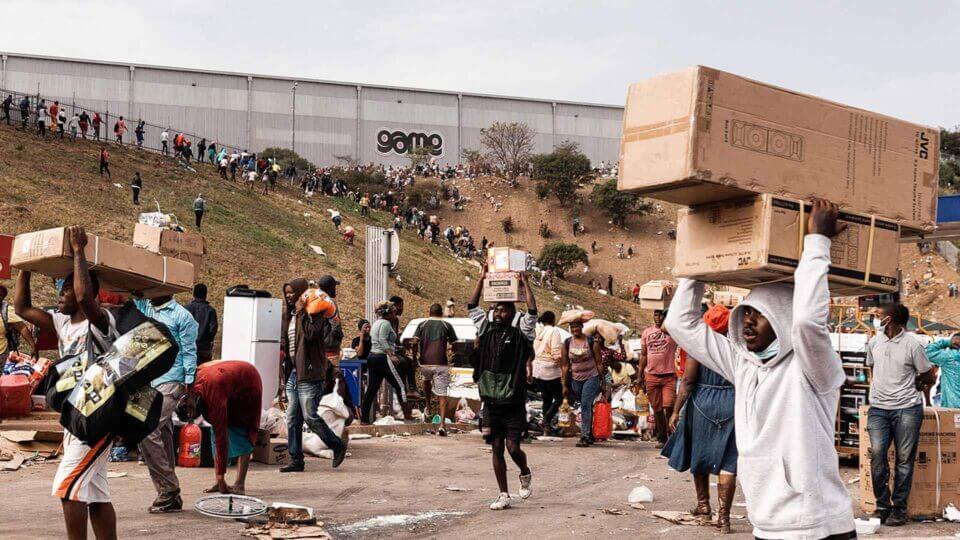
“One might notice that unlike in the 1990s, apart from a few occasional flare-ups, the struggle is no longer primarily between Xhosa and Zulu, or any African ethnicity for that matter. A crusade against whiteness had united black South Africans who would otherwise have been fighting among themselves.”
In a 2017 article published in The Daily Caller, columnist Ilana Mercer brought to light an under-appreciated aspect of South Africa’s anti-Apartheid movement: that activists espoused competing visions as to what the country should look like post white-minority rule. Not everyone was on board with the multiracial parliamentary democracy Nelson Mandela had in mind.
The main opposition Mercer cited came from black South Africans who were unhappy with the fact that Mandela’s African National Congress (ANC) party was dominated by an ethnic group other than their own. The ANC was majority Xhosa, while its chief rival, the Inkatha Freedom Party (IFP), had a largely Zulu base. Supporters of the two movements clashed violently in the streets leading up to the first multi-racial election in 1994.
The IFP’s founder, Mangosuthu Buthelezi, was Prime Minister of the Zulu Homeland. Homelands were self-governing ethnic enclaves set up by the Apartheid government for indigenous blacks, or “Bantu.” A Homeland’s size and location were based on rough estimates of where most members of a Bantu ethnic group lived prior to European colonization. Homelands were justified as a means to facilitate the eventual independence of various ethnically homogenous black countries while allowing white Afrikaners to have their own state as well. To that end, Pretoria lobbied for international recognition of the Homelands. The 1970 Black Homeland Citizenship Act was passed to expedite blacks’ acquisition of Homeland citizenship.
Despite its segregationist overtones, Buthelezi endorsed the Homeland policy. Given that neighboring Zimbabwe’s majority Shona ruling party, ZANU-PF, had just massacred the country’s Ndebele minority for siding with a rival faction in the struggle against white rule, the idea that Zulus ought to prefer their own state to living under the then-Xhosa-run ANC was far from outlandish. Mercer suspected that had Buthelezi had his way, South Africa would have developed a political system that enshrines regional autonomy to a much greater extent.
The foreign press would permit no such option, sparing no effort to attack Mandela’s opponents. Princeton Lyman, the then-United States Ambassador to South Africa, pressured Buthelezi and the IFP to stop “wrecking the process” of democratic transition. The New York Times smeared Buthelezi as a tool for white supremacy, an image that remains to this day. Journalist Eve Fairbanks, a former political writer for The New Republic, dismissed the Homelands as “always a farce” and their leaders “puppet rulers” in her 2022 book The Inheritors: An Intimate Portrait of South Africa’s Racial Reckoning.
The facts, however, suggest otherwise. A 1977 survey of black residents in Soweto, Durban, and Pretoria found Buthelezi to be the most popular politician, ahead of Mandela. To legitimize his role as a folk hero, Buthelezi, coming from a long line of tribal ministers, played up his family’s ties to past Zulu monarchs, including the infamous King Dingane who in 1838 slaughtered over 300 Dutch settlers at the town of Weenen. While studying at the University of Fort Hare, Buthelezi also became acquainted with future Zimbabwean president Robert Mugabe, an anti-colonial militant who instructed his supporters violently to seize land from white farmers.
Buthelezi’s black nationalist credentials ultimately did not work in his favor. Amidst a flurry of international support, Mandela’s vision prevailed. South Africa became a unitary parliamentary republic dominated by the ANC. Most Zulus were co-opted into the ANC big tent, though they remain a volatile partner. In July of 2021, unrest broke out in KwaZulu-Natal province after former President Jacob Zuma, a Zulu, was detained on corruption charges. Protestors looted over two hundred shopping malls. Property damages totaled an estimated $3.4 billion. In comparison, the unrest following the death of George Floyd in 2020 cost merely $2 billion.
The actions once taken by America’s progressive journalists, academics, and policymakers in South Africa offer critical insight as to why they insist today that their own country is steeped in white supremacy, and that any dissent from the narrative is but a manifestation of it. In many respects, South African politics under the ANC is less about balancing the competing demands of different black ethnic groups than about addressing their disparities vis-à-vis whites. All blacks regardless of ethnicity or tribal affiliation can benefit from Black Economic Empowerment (BEE), quota-based affirmative action programs blanketing everything from housing, jobs, schools, and the rewarding of state contracts. Zodwa Ntuli, Deputy Director General of South Africa’s Department of Trade and Industry, said that BEE is “critical to achieve the envisaged change in the patterns of ownership through the transfer of productive assets of the economy to black people.”
Since 2018, the ANC has repeatedly sought to pass a constitutional amendment that would allow the state to expropriate white-owned farms without compensation. While some observers lauded the policy for its potential to address definitively racial gaps in land ownership, others saw it as a reactionary move to blunt electoral support for smaller, more radical parties. One such party is Black First, Land First (BLF), which aims to topple the system of “white monopoly capital.” BLF was founded by a disgruntled former member of the left-wing Economic Freedom Fighters (EFF), a party known for inciting violence toward whites. In one interview, EFF president Julius Malema said that “we have not called for the killing of white people at least for now. I can’t guarantee the future.”
One might notice that unlike in the 1990s, apart from a few occasional flare-ups, the struggle is no longer primarily between Xhosa and Zulu, or any African ethnicity for that matter. A crusade against whiteness had united black South Africans who would otherwise have been fighting among themselves. Whereas Buthelezi stressed self-determination for all peoples, hence his willingness to work with Afrikaner nationalists, Mandela’s pan-Africanist approach demanded that blacks behave as a monolith that would propel the ANC to power in perpetuity.
Assuming the ANC’s American counterparts are just as concerned with clinging onto their expiring moral clout, it should come as no surprise then that the more diverse the United States becomes, the more they insist that white racism is systemic and insurmountable. Racism is the glue holding together the increasingly unruly coalition known as “people of color” lest they stop marching in lockstep for progressive hegemony.
When Asian parents protest school admission policies that prioritize black students, white supremacy is supposedly at work. One author writing for Time claimed that Asians compensate for their inferiority complex by hating blacks. “No matter how low down we [Asians] are,” she writes, “we know that America allows us to stand on the shoulders of Black, brown and Native people.” In other words, Asians and blacks would get along if it were not for white racists. The theory does not quite explain why there is anti-African discrimination in China and Japan, countries where there are no whites in charge.
Those who refuse to join the progressive campaign are denounced as stooges of white racism. One destroys that which he cannot control. Accordingly, South Africa’s Buthelezi was as much an Uncle Tom figure as the likes of Supreme Court Justice Clarence Thomas and South Carolina Senator Tim Scott. On a similar note, the former vice president of San Francisco’s Board of Education, Alison Collins, likened Asians who did not openly criticize former President Donald Trump to slaves. “Being a house n— is still being a n—,” she tweeted. One Washington Post op-ed even argued that Hispanics who voted for former President Trump had been under the spell of “multiracial whiteness,” a curious oxymoron.
The alternative to this aggressive coalition-building will only spell disaster for the progressive elites who have staked their entire careers on dispelling the notion that multiculturalism can be anything other than a harmless story of “diversity, equity, and inclusion.” Once again, South Africa offers a glimpse of what can happen when people of color turn on each other in the absence of a common enemy.
During the July, 2021 protests over former President Zuma’s imprisonment, the ANC government deployed the army to stem the rioting. Over 3,400 people were arrested. Images of armored trucks cruising through piles of burning rubble and heavily armed troops pinning hapless suspects to the ground were in stark contrast to the token response offered by many American police forces during the George Floyd incident. No lawmaker in this Rainbow Nation knelt to atone for his or her prejudices. Nor were there attempts to defend the looting or deflect blame onto racists. Announcing a total crackdown, President Cyril Ramaphosa stated that “what we are witnessing now are opportunistic acts of criminality, with groups of people instigating chaos merely as a cover for looting and theft. There is no grievance, nor any political cause, that can justify the violence and destruction…”
Interethnic rivalries defy democratic norms and cause total mayhem. Containing their worst excesses would require the liberal democratic state to drop all pretenses of egalitarian compassion, to peel away the velvet glove that hides its iron fist. Should the day come when whiteness could no longer be blamed, progressives in power must prepare to break up fights between their former pawns.
Guzi He is a J.D. candidate at the American University Washington College of Law and served as a 2023 legal fellow at Americans United for Life.











